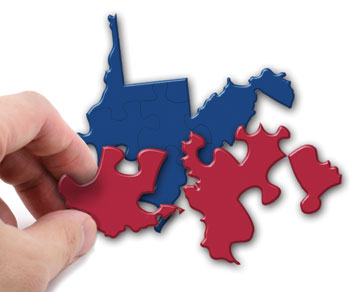- Like
- Digg
- Del
- Tumblr
- VKontakte
- Buffer
- Love This
- Odnoklassniki
- Meneame
- Blogger
- Amazon
- Yahoo Mail
- Gmail
- AOL
- Newsvine
- HackerNews
- Evernote
- MySpace
- Mail.ru
- Viadeo
- Line
- Comments
- Yummly
- SMS
- Viber
- Telegram
- Subscribe
- Skype
- Facebook Messenger
- Kakao
- LiveJournal
- Yammer
- Edgar
- Fintel
- Mix
- Instapaper
- Copy Link
On Monday we reported that HB 2383, which would specify factors that can (and cannot) consider in the redistricting process, appeared to be stalled in the House after leadership moved the bill to the House (inactive) Calendar presumably to avoid a lengthy floor debate on an amendment proposed by Delegate Mike Pushkin (D-Kanawha) that would honor the original intent of the bill by establish an independent commission tasked with drawing legislative and congressional district maps. Unfortunately, the bill failed to advance before Crossover Day (the deadline for bills to be out of the house of origin/Wednesday) even though Delegate Pushkin agreed to withdraw the amendment.
The next day the Senate Judiciary Committee took up a bill (HB 4002) passed by the House of Delegates earlier in the session mandating that the House go to 100 single delegate districts after the 2020 census, rather than the current mix of single and multi-member districts. While there are good arguments both for and against this change, as many delegates pointed out during the debate, what’s more important is who’s drawing the districts. In an interesting twist, Senator Stephen Baldwin (D-Greenbrier) offered and amendment to HB 4002 that would incorporate the provisions of a Senate bill (SB 54), a bill he co-sponsored with Senate Judiciary Chair Charles Trump (R-Morgan) and others, which would establish an independent commission to propose redistricting plans.
After much discussion and consulting the Senate parliamentarian about whether the amendment was relevant to the bill, Senator Trump ruled the amendment was too broad in scope because the proposed redistricting commission would draw district maps not only for the House, but also the Senate and Congressional districts, while HB 4002 pertained only to House districts. Senator Baldwin reformed his amendment so that it would only apply the redrawing of House districts, which would mean we would have separate redistricting processes in place for different offices if it were to pass.
Because the amendment was conceptual and committee members didn’t have exact language in front of them, Vice Chair Ryan Weld (R-Ohio), who was then filling in for the chair, laid the bill over to a future meeting so that committee counsel could prepare an amendment for them to review. The committee met Thursday and Friday, but the bill was not back on the agenda either day. It remains to be seen if it will be taken up again or if they will just run out the clock. Even thought members of their own party have pushed the idea of an independent redistricting commission for 20 years, it appears the Republican controlled Legislature doesn’t want to give up the opportunity to be in charge of drawing the maps during the next redistricting even though they have no guarantees that they will still be in control of the Legislature after 2020.



